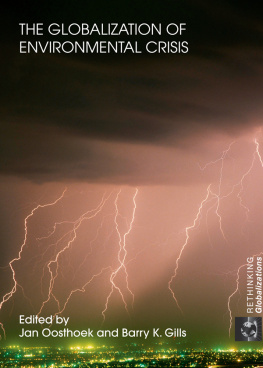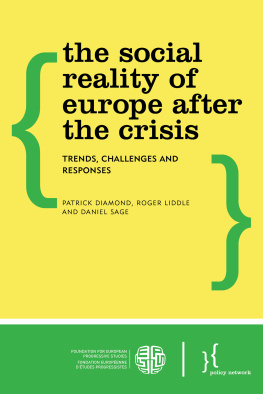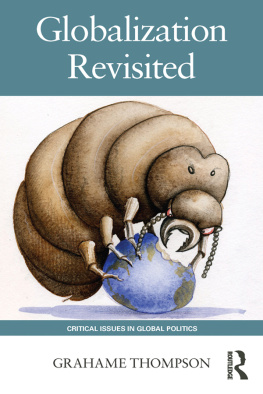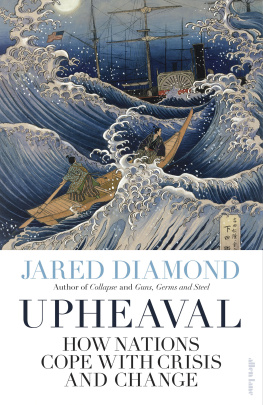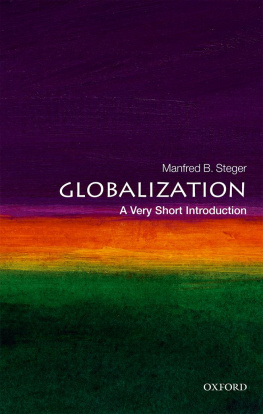Diamond - The Crisis of Globalization
Here you can read online Diamond - The Crisis of Globalization full text of the book (entire story) in english for free. Download pdf and epub, get meaning, cover and reviews about this ebook. year: 2018;2012, publisher: Bloomsbury UK, genre: Politics. Description of the work, (preface) as well as reviews are available. Best literature library LitArk.com created for fans of good reading and offers a wide selection of genres:
Romance novel
Science fiction
Adventure
Detective
Science
History
Home and family
Prose
Art
Politics
Computer
Non-fiction
Religion
Business
Children
Humor
Choose a favorite category and find really read worthwhile books. Enjoy immersion in the world of imagination, feel the emotions of the characters or learn something new for yourself, make an fascinating discovery.

The Crisis of Globalization: summary, description and annotation
We offer to read an annotation, description, summary or preface (depends on what the author of the book "The Crisis of Globalization" wrote himself). If you haven't found the necessary information about the book — write in the comments, we will try to find it.
Diamond: author's other books
Who wrote The Crisis of Globalization? Find out the surname, the name of the author of the book and a list of all author's works by series.
The Crisis of Globalization — read online for free the complete book (whole text) full work
Below is the text of the book, divided by pages. System saving the place of the last page read, allows you to conveniently read the book "The Crisis of Globalization" online for free, without having to search again every time where you left off. Put a bookmark, and you can go to the page where you finished reading at any time.
Font size:
Interval:
Bookmark:
Table of Contents
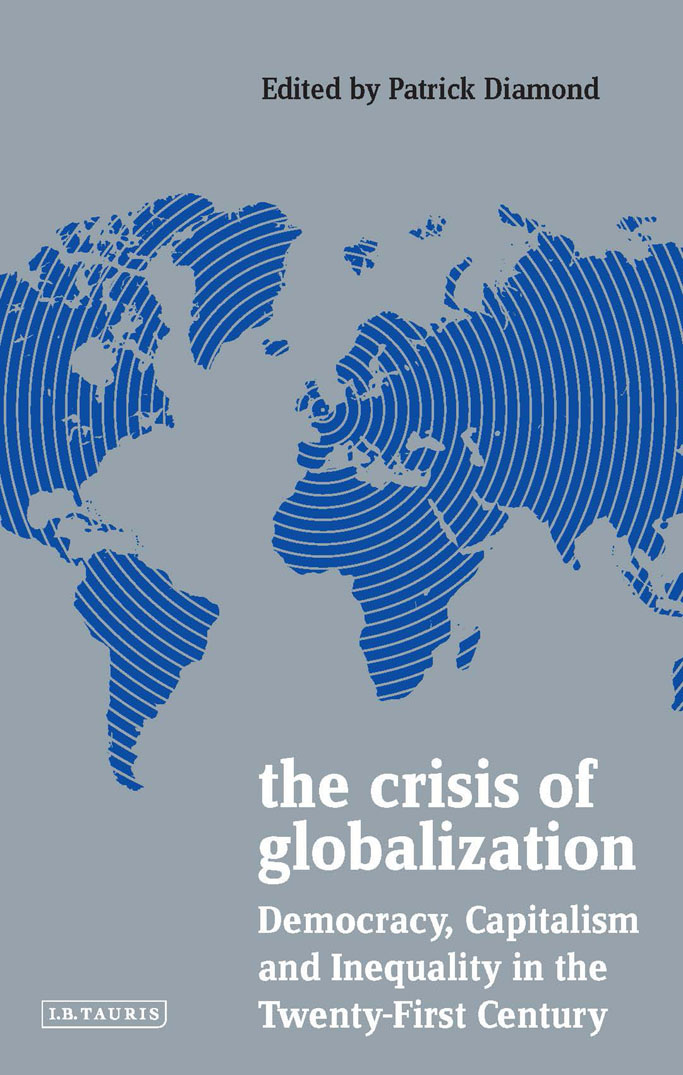
In recent years, the effects of economic openness and technological change have fuelled growing dissatisfaction with established political systems and led to new forms of political populism that exploit the economic and political resentment created by globalization. This shift in politics was evident in the decision by UK voters to leave the EU in June 2016, the November 2016 election of Donald Trump to the presidency of the United States, as well as the rise of populist movements on left and right throughout much of Europe. To many voters, the economy appears to be broken. Conventional politics is failing. Parties of the left and centre-left have struggled to forge a convincing response to this new phase of globalization in the aftermath of the 2008 crisis. This book examines the challenges that the new era of globalization poses for progressive parties and movements across the world. It brings together leading thinkers and experts including Andrew Gamble, Jeffry Frieden and Vivien Schmidt to debate the structural causes and political consequences of this new wave of globalization.
In the series:
After the Third Way: The Future of Social Democracy in Europe
Edited by Olaf Cramme and Patrick Diamond
ISBN: 978 1 84885 992 0 (HB); 978 1 84885 993 7 (PB)
Europes Immigration Challenge: Reconciling Work, Welfare and Mobility
Edited by Elena Jurado and Grete Brochmann
ISBN: 978 1 78076 225 8 (HB); 978 1 78076 226 5 (PB)
Left Without a Future? Social Justice in Anxious Times
Anthony Painter
ISBN: 978 1 78076 660 7 (HB); 978 1 78076 661 4 (PB)
Progressive Politics after the Crash: Governing from the Left
Edited by Olaf Cramme, Patrick Diamond and Michael McTernan
ISBN: 978 1 78076 763 5 (HB); 978 1 78076 764 2 (PB)
Governing Britain: Power, Politics and the Prime Minister
Patrick Diamond
ISBN: 978 1 78076 581 5 (HB); 978 1 78076 582 2 (PB)
The Europe Dilemma: Britain and the Drama of EU Integration
Roger Liddle
ISBN: 978 1 78076 222 7 (HB); 978 1 78076 223 4 (PB)
The Predistribution Agenda: Tackling Inequality and Supporting Sustainable Growth
Edited by Claudia Chwalisz and Patrick Diamond
ISBN: 978 1 78453 440 0 (HB); 978 1 78453 441 7 (PB)
The Crisis of Globalization: Democracy, Capitalism and Inequality in the Twenty-First Century
Edited by Patrick Diamond
ISBN: 978 1 78831 515 9 (HB); 978 1 78831 516 6 (PB)
Andrew Gamble
I n the last ten years there has been a marked rise in various forms of populism in Western democracies. The question is, why? One explanation is that it is the result of globalization, which has benefited some but not others, causing a backlash among the losers, who now seek to turn back globalization or obstruct its progress. The rise of the new populism is seen to be drawing its strength from those left behind by globalization, particularly the white working class in former heavy manufacturing districts. In this chapter I will examine this argument and its plausibility. One of the difficulties in pinpointing the argument is the vagueness of terms like populism and globalization, and the loose way they are used in political discourse. We will address our understanding of these terms before going on to explore the links between them, in particular the theory of the globalization paradox put forward by Dani Rodrik (Rodrik 2011). Attention will be paid throughout to political context: Globalization means different things in different periods and so does populism. They are not single uniform phenomena, rather there are many globalizations and many populisms (Berger and Huntington 2002; Canovan 1981; Mudde and Kaltwasser 2017; Muller 2016).
A crucial context for understanding the contemporary interrelationship between these terms is the financial crash of 2008 and its aftermath of relative economic failure. We are still in a period defined by the 2008 financial crash. At the end of 2017, it was already nine years since the financial crash itself, and more than ten years since the start of the 2007 credit crunch. Swift and decisive action by governments on both sides of the Atlantic in 2008 prevented a financial meltdown, but it came at a heavy cost. There was a sharp recession and a very slow recovery, characterized by sluggish growth, stagnant or depressed living standards, and low productivity (Gamble 2016). The failure of Western economies to rebound from the 2009 recession as they had from every previous recession since 1945 perplexed policy-makers, especially since interest rates remained close to zero, the central banks supported banks liquidity with quantitative easing, and private companies had mountains of cash available for investment.
In the second half of 2017 and the start of 2018 the growth prospects of the international economy began to improve. The IMF expected all leading economies, with the exception of the UK, to expand faster in 2018. Stock markets responded by reaching all time highs in the hope that the generalized recovery the world had been waiting for since 2009 was, at last, materialising. The tax cuts announced by the Trump administration were predicted to add a further stimulus to the world economy, even as they pushed the US deficit towards 1 trillion, and the overall debt to $20 trillion, 104 per cent of GDP. Many observers were still cautious about whether a corner had finally been turned. Anxieties about the future of the international economy continued to be voiced. The Bank of International Settlements, and some of its former officials, have drawn attention to the huge debts which still exist in the system and which threaten to explode should the authorities start to raise interest rates to the kind of levels needed for financial health. The flood of money which had been injected into the international economy since 2008 meant that many new forms of shadow banking had emerged, posing grave financial risks if interest rates started rising sharply. Yet interest rates needed to rise sharply to give the financial authorities sufficient room to lower rates again in order to deal with the next downturn. If there is another financial crash and associated economic recession while interest rates are still very low, and QE has not been unwound, then the international economy risks widespread debt defaults and a plunge into a far more serious recession than that of 2008. Central banks have run out of tools to avoid such an outcome (Evans-Pritchard 2018).
There are more optimistic views about the immediate prospects for the international economy, but there is general agreement that the structural problems highlighted in 2008 and the period which followed have not yet been solved. The issues of new governance arrangements for the international economy to reflect the shifting balance of power, the obstacles to raising growth rates and productivity and to finding profitable investment outlets, the mountain of debt public and private which still hang over the international economy, and the erosion of legitimacy and trust in those governing it, were all mostly unresolved in 2018. There was still a political impasse, and it was unclear what political forces could break the logjam. The ability of government to just about manage meant that although incumbents were frequently ousted, they were replaced by other incumbents, sometimes centre-left but mostly centre-right, who continued the broad international consensus on appropriate policy priorities and policy instruments. Many governments adopted austerity programmes in the expectation that shifting the burden of adjustment on to public services and private households would facilitate a strong recovery. But the austerity programmes dragged on endlessly without stimulating recovery or eliminating the deficit or the accumulated public debt which, in many countries including the United States and the UK, continued to rise. Some of the deepest austerity was experienced in the eurozone, because of its sovereign debt crisis in 201012. It was temporarily solved by the European Central Bank finding its way to act as other Central Banks and beginning its own programme of quantitative easing (QE). It is against this background of national economies, still functioning but failing to bounce back, that the rise of populism needs to be understood.
Next pageFont size:
Interval:
Bookmark:
Similar books «The Crisis of Globalization»
Look at similar books to The Crisis of Globalization. We have selected literature similar in name and meaning in the hope of providing readers with more options to find new, interesting, not yet read works.
Discussion, reviews of the book The Crisis of Globalization and just readers' own opinions. Leave your comments, write what you think about the work, its meaning or the main characters. Specify what exactly you liked and what you didn't like, and why you think so.


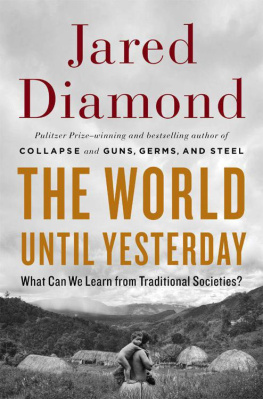
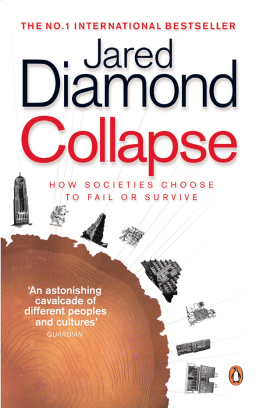

![Diamond - By Lisa M. Diamond: Sexual Fluidity: Understanding Womens Love and Desire [Paperback]](/uploads/posts/book/138039/thumbs/diamond-by-lisa-m-diamond-sexual-fluidity.jpg)


